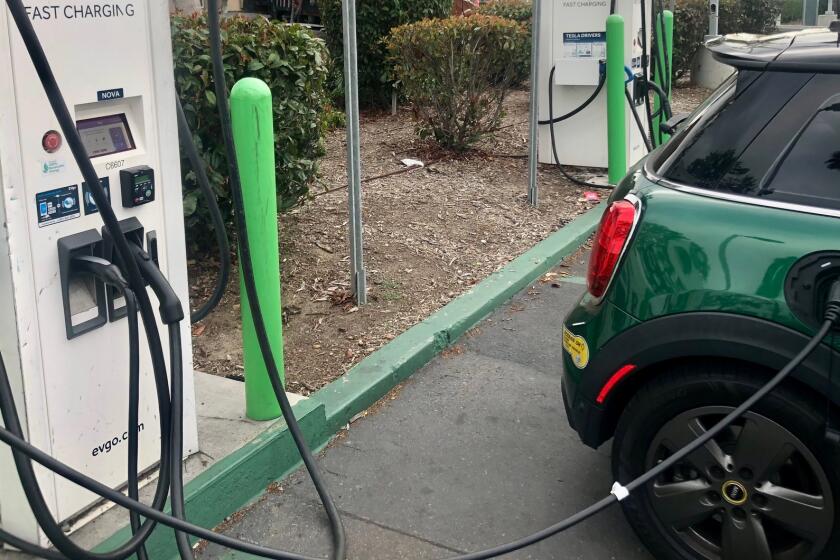Holiday shopping -- just don’t
As if American consumers don’t already have enough on their minds, here come Black Friday and Cyber Monday, the nation’s annual rituals of mandatory shopping. The looming twosome are like unwanted dinner guests who arrive in the middle of a stressful marital spat or nerve-racking toddler meltdown. We want to say, “Just go away.” But there they are on the doorstep, hungry beasts with cloying smiles, dangling a GPS for under $100 and a Blu-ray player at the amazing price of $128.
I’m betting they’re turned away, and this year will be different. The usual subtle pressures to shop in order to keep the economy humming have been notably absent. Television coverage of sharp-elbowed shoppers will be replaced by mournful accounts of out-of-work breadwinners and somewhat cheerier how-tos on paying in cash. Neither pundits nor politicians -- nor even Op-Ed writers -- will dare suggest that the consumer has a duty, patriotic or otherwise, to fork over more money or take on more debt to buy a boatful of cheap, made-in-China items. Trust me, 2008 will be the holiday season that wasn’t.
Americans are facing an economic collapse steeper, more widespread and potentially far longer lasting than anything experienced since the 1930s. The decline in the stock market is the most dramatic of the indicators: Investors have lost all of the gains of the last 11 years. The end of the home-price collapse/foreclosure crisis is still not within sight. And unemployment is soaring. The official rate of 6.5% is a significant underestimate of true joblessness. As early as July, the Economic Policy Institute reported that there were 2.6 job seekers for every open position; that imbalance is sure to be much higher now.
For the last two decades, the U.S. has been a consumer-driven economy. Bursts of spending have lifted us out of a series of short, not-too-painful recessions. And consumers are well aware of their “heroic” role. They’ve been told over and over that their spending is the basis for our economy. (Less discussed is how the consumer binge led to our gaping trade deficit.) But there’s an underlying paradox: Most American households have seen their pay rates stagnate, so buying has only been possible by working more hours or taking on credit. Now there are no extra hours, and wary consumers aren’t taking on credit even when it is available.
These imbalances, at the household, national and global level, appear to be well understood by consumers. They recognize that a business-as-usual binge is likely infeasible and certainly unwise.
Predictably, consumers have clamped their wallets shut. A 1.3% decline in retail spending in September ballooned to 2.8% in October, the largest one-month drop in the history of that statistic. Facing such financial uncertainty, who would buy a new car, TV, stereo or sofa? Restaurant spending is dramatically off too, and credit card use is down. While some consumers have been on a debt-fueled binge for quite awhile, apparently they haven’t forgotten how to sober up. And fast. They’re acting smart and cautious. That’s a good thing. Scaling back on gifts and holiday spending this year suddenly seems like the socially acceptable thing to do. Spending liberally can feel unseemly. Even older children will recognize that these are unusual times.
In fact, reining in holiday spending is a message some have been broadcasting for a while. Adbusters, with its Buy Nothing Day, begun in 1992, urges consumers to boycott Black Friday by refusing to purchase anything on the day after Thanksgiving. Performance artist the Rev. Billy Talen and his Church of Stop Shopping target the excesses of the season. The organization I helped to found, the Center for a New American Dream, helps people simplify the holidays by promoting socially responsible gifts, alternative gift fairs and spending time with family and community.
These and many other groups have long recognized that the consumer binge was unsustainable, financially and environmentally. It has been depleting our savings, to be sure, but also degrading the atmosphere, destroying ecosystems and undermining the potential of the planet to support life in all its magnificent forms. Ecological footprint analysis reveals that by the late 1970s, humans had begun to draw down stocks of “natural capital” -- that is, degrade the Earth’s ecosystems. We’re turning arable land into deserts, transforming ocean areas into chemically induced dead zones and heating up the climate.
The U.S. holiday season, with its traditional excess, has long been an outsized part of that decline. Roughly a quarter of annual spending, garbage and ecological impact occurs between Thanksgiving and New Year’s. Measured in carbon alone, that represents five tons of emissions for each American.
This means that there’s even more reason to turn away those unwanted dinner guests, Black Friday and Cyber Monday. Don’t feel guilty about it. We can find better ways to support one another than funneling our money through giant multinationals in hopes that some trickles down to its employees. Support local and socially responsible businesses when buying what you need. Give all that you can to those who are suffering. Spend less time in malls and more connecting with friends and family. If the experience of those who have already decommercialized their holidays is any guide, you’ll find yourself less stressed, more fulfilled and with a little more money in your pocket. I suggest more music, less wrapping paper.
Juliet Schor is a sociology professor at Boston College and is on the board of the Center for a New American Dream.
More to Read
A cure for the common opinion
Get thought-provoking perspectives with our weekly newsletter.
You may occasionally receive promotional content from the Los Angeles Times.










